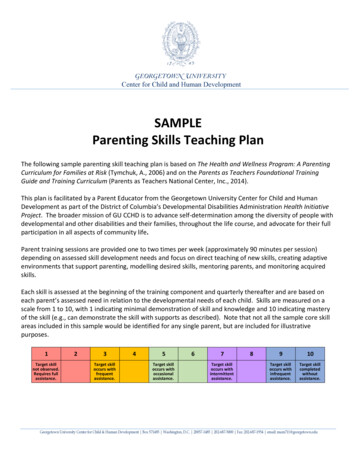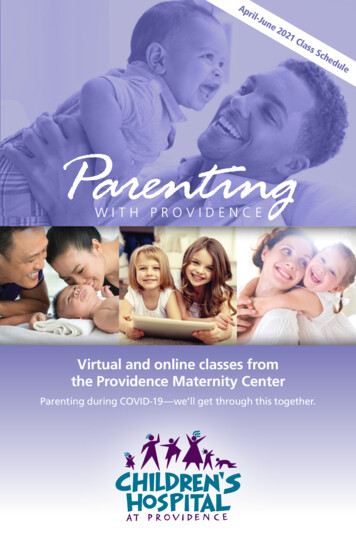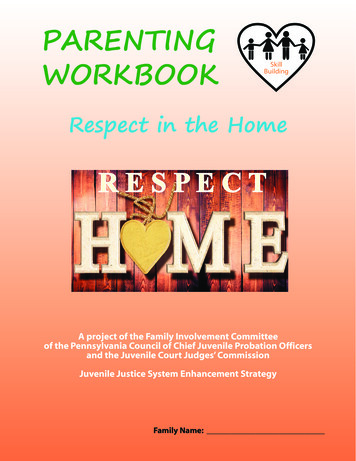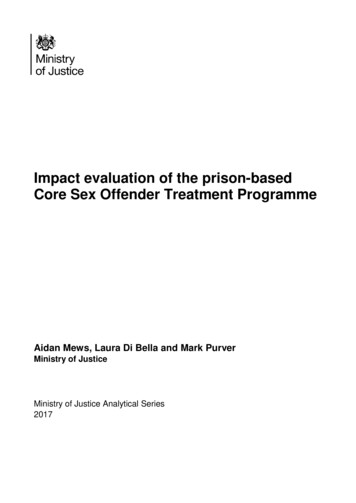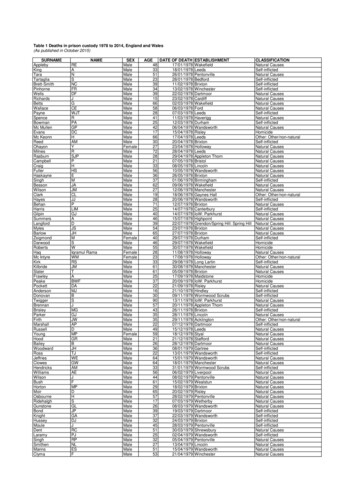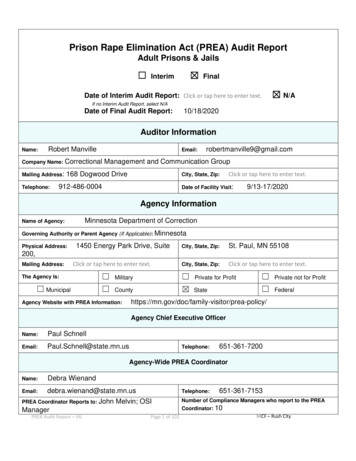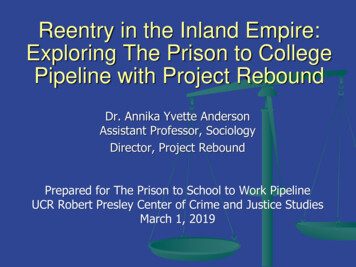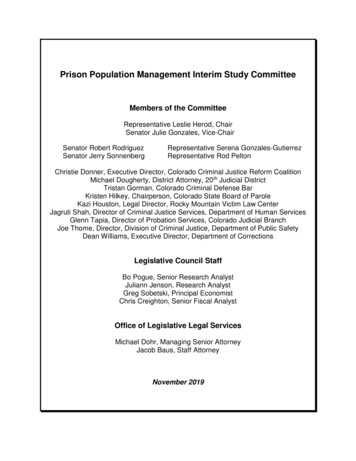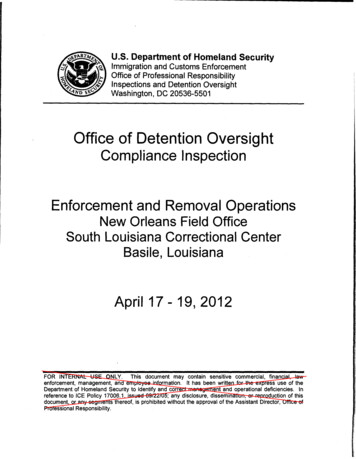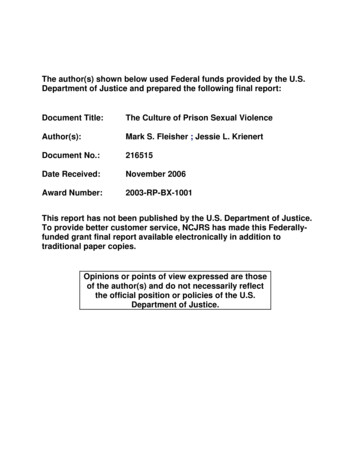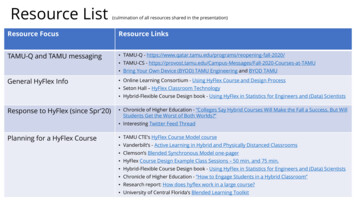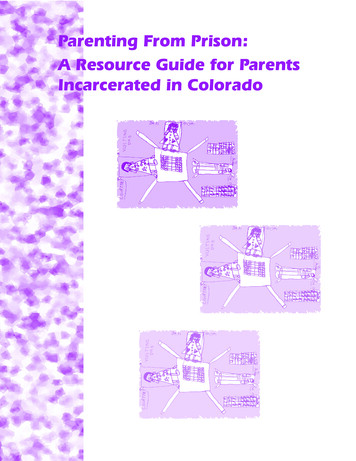
Transcription
Parenting From Prison:A Resource Guide for ParentsIncarcerated in Colorado
Parenting From Prison: A Resource Guide forParents Incarcerated in Colorado1Parenting from Prison:A Resource Guide for ParentsIncarcerated in ColoradoAbout the Cover:The drawing used on the cover is by Courtney Gee whowas age 11 at the time of the drawing.She said:Courtney’s Mother, Jan says, “Courtney has visited herdad in jail or prison since she was two days’ old. We makevisitation as pleasant as we can. Her dad plays games andtalks to her about school, her friends and family. Thiscontinues the bond between father and daughter andhelps her father have a better look on life.”
2Parenting From Prison: A Resource Guide forParents Incarcerated in ColoradoCopyright 2002 by Barbara S. Bosley, Christie Donner, Carolyn McLean and Ellen Toomey-Hale.Permission for copying and reprinting this material is granted. The editors request that the followingcitation be prominently reproduced on the material that is copied or reprinted:Bosley, B., Donner, C., McLean, C., and Toomey-Hale, E, (Eds.) (2002). Parenting From Prison - AResource Guide for Parents Incarcerated in Colorado. Parenting from Prison Guide Committee. Denver,Colorado.Funding to print this resource manual was provided by a generous grant from the RoseCommunity Foundation of Denver. We would like to thank the Rose Community Foundationand Lynda Ricketson, Program Officer.
Parenting From Prison: A Resource Guide forParents Incarcerated in Colorado3The following individuals were members of a committee that developed this resource guide. Finalwriting and editing was done by Barbara Bosley, Christie Donner, Jan Gee, Esther Griswold, CarolynMcLean, M. Kay Teel, and Ellen Toomey-Hale. Cover and text layout and design by Terry Nyberg.Barbara BosleyDenver Juvenile CourtDenver, ColoradoRon LeybaColorado Department of CorrectionsColorado Springs, ColoradoLeslie DareEl Paso Department of Human ServicesColorado Springs, ColoradoCarolyn McLean20th Judicial DistrictBoulder, ColoradoChristie DonnerRocky Mountain Peace & Justice CenterBoulder, ColoradoTerry Nyberg11th Judicial DistrictCanon City, ColoradoJuanita Fuller-ScottDenver Women’s Correctional FacilityDenver, ColoradoJessica PearsonCenter for Policy ResearchDenver, ColoradoJan GeeMother of Incarcerated SonLafayette, ColoradoMelanie PetagoDenver Women’s Correctional FacilityDenver, ColoradoEsther GriswoldCenter for Policy ResearchDenver, ColoradoMelinda RomeroColorado Works ProgramDenver, ColoradoChristopher HardawayAttorney at LawDenver, ColoradoMolly RorvigDenver Women’s Correctional FacilityDenver, ColoradoDi HolmesFamily Preservation/Family Resource SupportDenver, ColoradoM. Kay TeelRocky Mountain Peace & Justice CenterDenver, ColoradoCarol KellyColorado Department of Human ServicesDenver, ColoradoEllen Toomey-HaleAttorneyPlatteville, CODana LeybaDenver Women’s Correctional FacilityDenver, ColoradoOur deep appreciation to the parents in prison who participated in focus groups to edit andevaluate this manual. Your input was invaluable. Our special thanks to: Charrise, Nakeisha, Rebecca,Sheila, Penny, Michelle, Arlo, Michael, Will, and Jimmy. Members of the committee also thank Dr.Mary West, Colorado Department of Corrections, for her support of this project.IMPORTANT: This resource guide is intended to give you information. It is NOT meant to giveyou legal advice. You are strongly advised to contact an attorney for legal advice regardingany questions you have.Members of the committee are not able to answer questions or give any legal advice. If youhave any comments regarding this Resource Guide or would like a copy, please contact:Christie Donner, Rocky Mountain Peace & Justice Center, P.O. Box 1156, Boulder, CO 80306.
Parenting From Prison: A Resource Guide forParents Incarcerated in Colorado4Table of ContentsIntroduction . 6Why should I read this manual?Parenting From Prison . 8How does being in prison change how I parent?How are my children affected by my incarceration?What can I do to help my children adjust during my incarceration?(Answers to these questions and more)Making Custody Arrangements for Your Children . 25What is a Power of Attorney?What is a Legal Guardianship?What is Allocation of Parental Responsibilities?What if I want to get divorced or am served with divorce papers while I’m in prison?Why would I choose to place my children for adoption?(Answers to these questions and more)Financial Help for the Care of Your Children . 35What is TANF?What are food stamps?What is Medicaid?(Answers to these questions and more)Dependency & Neglect Court Cases . 37What is a Dependency & Neglect case?Who are the people involved in a Dependency & Neglect case?Why is it important to be actively involved in a Dependency & Neglect case?Does my incarceration mean my parental rights will be terminated?(Answers to these questions and more)Paternity . 47Who can file a Paternity case?Why would I file a Paternity case?What happens in a Paternity case?(Answers to these questions and more)Child Support . 48Do I have to pay child support while I am in prison?Is it possible to have my child support payments lowered while I am in prison?How do I lower my child support payments while I am in prison?Can money be taken from my prison account to pay for child support and/or restitution?(Answers to these questions and more)Attachments . 52Attachment A: Sample letter to Judge asking to attend a hearing . 53Attachment B: Sample letter asking for visits . 54Attachment C: Letter of Introduction / Identification of Relatives . 55Attachment D: Motion to Modify Child Support . 56Attachment E: Power of Attorney . 59Attachment F: Motion to File Without Payment & Financial Affidavit . 60Attachment G: Finding and Order Concerning Payment of Fees . 61
Parenting From Prison: A Resource Guide forParents Incarcerated in ColoradoDirectories . 62Directory 1: List of District Courts’ Judicial District Directory . 63Directory 2: List of Family Court Facilitators . 65Directory 3: County Departments of Social Services, Child Welfare Offices . 68Directory 4: County Child Support Enforcement Units . 71Directory 5: Department of Corrections Facilities, Inmate Locator and Parole . 74Directory 6: Community Resources for Incarcerated Parents . 76Glossary . 78Event Log . 81Acknowledgments . 82Evaluation Form . 835
6Parenting From Prison: A Resource Guide forParents Incarcerated in ColoradoIntroductionIn the past twenty years, there has been anunprecedented growth in the number of peopleincarcerated in the United States. Currently,there are more than 2 million adults in prison orjail. What is often overlooked in the design ofcriminal justice policy in the United States is thefact that the majority of women and men inprison are parents of children under the age of18. Although exact numbers are not known, it isestimated that 1.7 million children have a fatherin prison and 200,000 children have a motherin prison in the United States.Mothers in Prison in Colorado:National statistics indicate that 70-80percent of women in prison are mothers whohave an average of 2.5 children under the age of18 living with them prior to their arrest andimprisonment. 85 percent of the children whohave a mother in prison are under the age of 10.Another 6 percent of women enter prisonpregnant. Currently, there are more than 1,300women in prison in Colorado. Although nostate agency tracks the number of children inColorado who have a mother in prison, basedon national averages, it is estimated thatapproximately 2,500 children in Colorado havea mother in prison.Fathers in Prison in Colorado:National statistics estimate that 55 percent ofmen in prison are fathers of children under the ageof 18. A third of men in prison are fathers to morethan one child. Currently, there are more than15,000 men in prison in Colorado. Therefore, it isestimated that there are 13,000 children inColorado who have a father in prison.In Colorado, it is estimated that 15,500children currently have a parent inprison. A much larger number haveexperienced the incarceration of aparent at some point in their lives.There can be many emotional, financial, andlegal issues that arise when a parent isincarcerated. Understanding how children areimpacted when a parent is incarcerated is veryimportant for parents, caregivers, and policymakers. It is often said that when a parent isincarcerated, children and families do the time,too. Children who have a parent in prison areoften trying to cope with the traumaticseparation from a parent and the instability intheir living arrangements. Children can also betraumatized if they witnessed the arrest of aparent.Although many children who have a parentin prison adjust well and go on to have verysuccessful lives, parents in prison should also beaware that studies have shown that childrenwith an incarcerated parent are much morelikely to have difficulties in school, bothacademically and behaviorally. Also, childrenwith a parent in prison are more likely to engagein substance abuse and delinquency than theirpeers who don’t have a parent in prison.In Colorado, 50 percent of female juvenilesand 25 percent of male juveniles in detentionexperienced the incarceration of a parent atsome point in their childhood. Another study inOhio found that children who have a mother inprison are 5-6 times more likely to beincarcerated in their lifetime than children wholive in poverty but who don’t have a mother inprison.Why should I read this resourceguide?Serving time in prison does NOT meanthat you have lost your right to makedecisions about the care of yourchildren or that your relationships withyour children have become any lessimportant.
Parenting From Prison: A Resource Guide forParents Incarcerated in ColoradoEven though you will be physically separatedfrom your children and many parentalresponsibilities will be handled by someone else,it is important to continue to see yourself as aparent to your children. Parenting from prisonisn’t easy, but it isn’t impossible, either.As one mother in prison said,“This manual is good for [parents]because it gives them ways to keeptheir family together behind the wallas well as help them to understand theimportance of dealing with custodyissues.”An incarcerated father said,“The relationship with my kids is themain thing—staying in contact withthem. I try to stay involved in their lives.”This resource guide is written for parents inprison who are trying to cope with theemotional, financial, and legal issues regardingtheir children that arise during theirincarceration. This resource guide tries toanswer questions you may have as a parent inprison. Because everybody’s situation is unique,there may not be an answer for every questionyou may have. It is our hope that this resourceguide will help you have a better understandingof some of the emotional, financial, and legalissues you may be facing so that you can makedecisions that will best meet the needs of yourchildren.In addition to providing you withinformation about your legal rights andresponsibilities as a parent, this resource guidewill also give you practical suggestions aboutwhat steps you can take while you areincarcerated to make it more likely that you willremain in contact with your children while youare in prison and be reunited after your release.It will also give you information on how torequest that your child support payments be7lowered so that you don’t have a large debt whenyou are released from prison.The legal information and the formsenclosed in this resource guide are based oncurrent Colorado law. You should make surethat the information and forms are up to date.We’ve included the legal code numbers (cites) sothat you can research them in the law library formore information.
8Parenting From Prison: A Resource Guide forParents Incarcerated in ColoradoParenting From PrisonDespite the large number of familiesseparated due to incarceration, the majority ofparents who are incarcerated are able eventuallyto reunite with their children.Even though there are challenges incontinuing your role as a parent, it is veryimportant both for you and your children. Bothmothers and fathers play very important roles intheir children’s development of a sense ofidentity, security, and belonging which willaffect them throughout their lives.The major concerns for most parents whoare incarcerated are:1) dealing with the emotions of beingseparated from their children,2) making decisions regarding the placementand care of their children,3) maintaining contact with their childrenduring their incarceration, and(4) reuniting with their children once they arereleased from prison.Parenting from prison isn’t easy. However, itis possible to play an active role in yourchildren’s lives. Unfortunately, many parents inprison lose contact with their children. Thisdoes not have to happen.To avoid losing contact with yourchildren, it will take effort on your part,the part of the children’s caregiver, andmaybe even the court.You will probably get frustrated or feeloverwhelmed at times. Communicating withstate agencies, courts, your children, or theircaregiver can be very difficult, especially fromprison. Some family relationships may bestrained. Transportation problems may preventyou from having regular visits with yourchildren. Sometimes, it may feel like it isimpossible to stay in touch with your children.All of these challenges are real and must beovercome. It will require patience, creativity,and persistence on your part. Always rememberthat being a parent is the most challenging andrewarding job you’ll ever have.You, your children, and the person who istaking care of your children are all affected byyour incarceration. This section offersinformation on how you can deal with yourown feelings around being separated from yourchildren so that you can parent most effectively.This section will also help you understandhow your incarceration affects your children andhow to establish a working relationship with theperson who is taking care of your childrenduring your incarceration. It also offers somepractical suggestions on what you can do tomake the most of this difficult situation.Being a Parent Who is IncarceratedHow does being in prison change howI parent?Being physically separated will obviouslylimit your ability to parent in the same way asyou did before you were incarcerated. Eventhough you are still a parent, you will probablynot be handling many of the day-to-daydecisions and activities normally involved withraising children, including providing for theirdaily needs and even discipline. This changemay leave you with a sense of loss andconfusion, especially if you were living withyour children before you went to prison.Even though you may not be involved inthe day-to-day care of your children, youcan still provide them with emotionalsupport and guidance that is veryimportant to them.You may also be actively involved in makingimportant decisions regarding their lives,including who you want to take care of them
Parenting From Prison: A Resource Guide forParents Incarcerated in Coloradowhile you are away. For both you and yourchildren, it is important to understand that youcan still be an active and caring parent, eventhough you are in prison. It is also important foryou to understand that your children are copingwith a lot, too, and they will need time andsupport to adjust to someone else providing fortheir daily needs.What if I didn’t have much contactwith my children prior to myincarceration? Is it too late to try andestablish a relationship with mychildren now that I’m in prison?Even if you didn’t have much or any contactwith your children prior to your incarceration, itis never too late to try and have a relationshipwith your children. As one father put it, goingto prison caused his “priorities to change”greatly. However, trying to start a relationshipwith your children after you are in prison maybe complicated and may require you to takeseveral smaller steps rather than just one bigleap.Before you take any steps to make contactwith your children, it is important that youreally think about the commitment you canmake to your children and what you are willingto do on a consistent basis. It is very hard onchildren to have a parent drop in and out oftheir lives.Once you have decided that you really wantto see if starting a relationship with yourchildren is possible, the next thing you will needto consider is what steps you might need totake. Unless you’ve been ordered by a court notto have any contact with your children or theirother parent (or caregiver), you might considerwriting a letter to the children’s caregiver andsee if they are open to the idea of you trying toestablish a relationship with your children.9If you had a pretty good relationship withthe other parent or caregiver, they may bewilling to help you establish a relationship withyour children. If you don’t have a very goodrelationship with your children’s other parent orcaregiver, you may need to try and resolve someof the issues between the two of you before youcan move forward with establishing arelationship with your children. It’s importantto remember that building any relationshiptakes time and trust. You might need to moveforward slowly and gently. Hopefully, you andthe children’s other parent or caregiver will tryand work together to find out what’s best foryour children, even if you are unable to resolveall of the problems between the two of you.If the other parent refuses to allow you tohave any contact with your children, you mayneed to go to court and ask for visitation orother contact with your children. This is morefully discussed on page 29 (“Allocation ofParental Responsibilities”).What can I do to emotionally copewith being separated from mychildren?How well you deal with yourincarceration will have a direct influenceon how well your children cope.You may have feelings of regret, loss,depression, guilt, anxiety, or helplessnessbecause you are separated from your children.You may also be afraid of being rejected by yourchildren or resentful that your children arebonding to someone else while you are inprison. You may also feel angry that you are inprison or feel that you were treated unfairly bythe criminal justice system. Because yourreactions will affect your children, it isimportant that you start with yourself and try todeal with these emotions so that you can besthelp your children in their adjustment.
10Parenting From Prison: A Resource Guide forParents Incarcerated in ColoradoThe following are some thing
Attorney Platteville, CO Our deep appreciation to the parents in prison who participated in focus groups to edit and evaluate this manual. Your input was invaluable. Our special thanks to: Charrise, Nakeisha, Rebecca, Sheila, Penny, Michelle, Arlo
